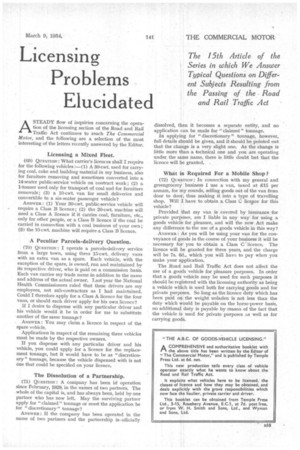Licensing Problems Elucidated
Page 121

If you've noticed an error in this article please click here to report it so we can fix it.
ASTEADY flow of inquiries concerning the operation of the licensing section of the Road and Rail Traffic Act continues to reach The Commercial Motor, and the following are a selection of the most interesting of the letters recently answered by the Editor.
Licensing a Mixed Fleet.
(69) QUESTION: What carrier's licences shall I require for the following vehicles :—(1) A 30-cwt. used for carrying coal, coke and building material in my business, also for furniture removing and sometimes converted into a 14-seater public-service vehicle on contract work ; (2) a 1-tonner used only for transport of coal and for furniture removals ; (3) a 10-cwt. van for small deliveries and convertible to a six-seater passenger vehicle?
ANSWER: (1) Your 30-cwt. public-service vehicle will require a Class B licence ; (2) the 20-cwt. machine will need a Class A licence if it carries coal, furniture, etc., only for other people, or a Class B licence if the coal be carried in connection with a coal business of your own ; (3) the 10-cwt. machine will require a Class B licence.
A Peculiar Parcels-delivery Question.
(70) QUESTION: 1 operate a parcels-delivery service from a large town, using three 15-cwt.. delivery vans with an extra van as a spare. Each vehicle, with the exception of the spare, is owned, run and maintained by its respective driver, who is paid on a commission basis. Each van carries my trade name in addition to the name and address of the actual owner. Last year the National Health Commissioners ruled that these drivers are my employees, not sub-contractors as I had maintained. Could I therefore apply for a Class A licence for the four vans, or should each driver apply for his own licence?
If I desire to dispense with any particular driver and his vehicle would it be in order for me to substitute another of the same tonnage?
. ANSWER: You may claim a licence in respect of the spare vehicle.
Applications in respect of the remaining three vehicles must be made by the respective owners.
If you dispense with any particular driver and his vehicle, you could apply for a licence for the replacement tonnage, but it would have to be as " discretionary " tonnage, because the vehicle dispensed with is not One that could be specified on your licence.
The Dissolution of a Partnership.
(71) QUESTION: A company has been id operation since February, 1929, in the names of two partners. The whole of the capital is, and has always been, held by one partner who has now left. May the surviving partner apply for " claimed " tonnage or must the application be for " discretionary " tonnage?
ANSWER If the company has been operated in the name of two partners and the partnership isofficially dissolved, then it becomes a separate entity, and no application can be made for " claimed " tonnage.
In applying for " discretionary " tonnage, however, full details should be given, and it should be pointed out that the change is a very slight one. As the change is little more than a technical one and you are operating under the same name, there is little doubt but that the licence will be granted.
What is Required For a Mobile Shop ?
(72) QUESTION: In connection with my general and greengrocery business I use a van, taxed at £15 per annum, for my rounds, selling goods out of the van from door to door, thus making it into a type of travelling shop. Will I have to obtain a Class C licelice for this vehicle?
Provided that my van is covered by insurance, for private purposes, am I liable in any way for using a goods vehicle for pleasure, and will the new Act make any difference to the use of a goods vehicle in this way?
ANSWER: As you will be using your van for the conveyance of goods in the course of your business it will be necessary for you to obtain a Class C licence. The licence will be granted for three years, and the charge will be Is. ad., which you will have to pay when you make your application.
The Road and Rail Traffic Act does not affect the use of a goods vehicle for pleasure purposes. In order that a goods vehicle may be used for such purposes it should be registered with the licensing authority as being a vehicle which is used both for carrying goods and for private purposes. So long as the licence duty which has been paid on the weight unladen is not less than the duty which would be payable on the horse-power basis, no additional duty is payable by reason of the fact that the vehicle is used for private purposes ftS well as for carrying goods.












































































































































































